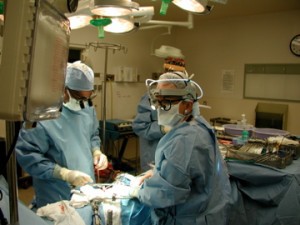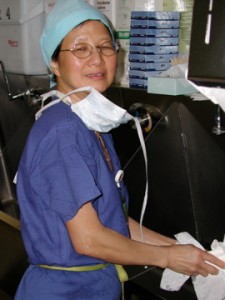A successful deceased donor transplant program entails many elements, but perhaps one of the most vital elements is a well informed and dedicated nursing staff. Transplant nursing expertise must be present on many levels, from the ICU to the Operating Theater to the patient wards to the outpatient clinic.
of the most vital elements is a well informed and dedicated nursing staff. Transplant nursing expertise must be present on many levels, from the ICU to the Operating Theater to the patient wards to the outpatient clinic.
First and foremost, any nurse involved in the transplant process at whichever point must be devoted to the cause. Transplantation and organ donation are true modern day miracles. People’s lives are saved. People’s lives are improved. People’s lives are transformed. Organ donation brings great meaning and honor to the donor and the donor’s family and loved ones. Nurses who understand these points and honestly believe in them will be the most effective caregivers and patient/family advocates.
donor’s family and loved ones. Nurses who understand these points and honestly believe in them will be the most effective caregivers and patient/family advocates.
Nurses in the ICU and even in the Emergency Rooms can play an important role in the organ donation process by recognizing impending or suspected brain death cases and informing the physicians and other caregivers in a timely fashion. Simple bedside observations, such as an absent gag reflex, absence of spontaneous respirations over ventilator support and fixed and dilated pupils, should prompt further investigations leading to consultation for a formal brain death exam. These clinical triggers can easily be protocolized so that the entire nursing staff is sensitized to calling an early alert. Timely recognition of brain death is important for a number of reasons: it allows for the consideration of organ donation, it can save significantly on hospital costs by avoiding unnecessary and expensive ICU care and, most importantly, it gives time for the healthcare team to engage with and compassionately educate family members on exactly what brain death is.
Once brain death has been declared and clearly explained to the family, the Transplant Coordinator is introduced who counsels the family during their grief and, when appropriate, begins discussion about the possibility of organ donation. If the family consents to organ donation, then the ICU nurses and doctors must work together to keep the potential donor stable before the recovery operation to remove the organs for transplant. This period of time is variable, depending how long it takes to mobilize the various surgical teams to come to recover the different organs, but can last anywhere from a few hours to even a few days. During this time, nurses stay with the patient to maintain the blood pressure, oxygenation and correct any metabolic abnormalities. They also interact with the family and the Transplant Coordinator during this profoundly difficult period of tragedy and loss. This is often when families come to terms with their loss by realizing that their loved one is a true hero, saving other people’s lives and living on in others.
The Liver Transplant Nursing Team in the operating theater must be well versed in the conduct of this difficult surgery and be absolutely devoted to the cause. They, as everyone else involved, are part of something very special. In this critical moment, their skill and attention to detail is every bit as important as the surgeons’ and anesthesiologists’ expertise. By necessity, a core group—the Liver Transplant Nursing Team—needs to be ready at a moment’s notice to devote many challenging hours in the operating theater to ensure that the patient does well and that the patient’s family has a positive experience. Nurses have an innate ability for emotional support and attention to the patient’s comfort and these qualities are just as important as their knowledge of such complicated procedures as liver transplant.
conduct of this difficult surgery and be absolutely devoted to the cause. They, as everyone else involved, are part of something very special. In this critical moment, their skill and attention to detail is every bit as important as the surgeons’ and anesthesiologists’ expertise. By necessity, a core group—the Liver Transplant Nursing Team—needs to be ready at a moment’s notice to devote many challenging hours in the operating theater to ensure that the patient does well and that the patient’s family has a positive experience. Nurses have an innate ability for emotional support and attention to the patient’s comfort and these qualities are just as important as their knowledge of such complicated procedures as liver transplant.
Back in the ICU, the nursing team must pay special attention to the specific needs of the transplant patient. They must understand what was done in the OT so they can look out for potential complications associated with the surgery. They work closely with the rest of the Transplant Team, including Surgeons and Intensivists, Hepatologists. Nurses are usually the first to detect any problems or deviations from a normal postoperative course, so their effective communication skills are valued and respected by the entire team.
transplant patient. They must understand what was done in the OT so they can look out for potential complications associated with the surgery. They work closely with the rest of the Transplant Team, including Surgeons and Intensivists, Hepatologists. Nurses are usually the first to detect any problems or deviations from a normal postoperative course, so their effective communication skills are valued and respected by the entire team.
This procedure allows seeing abnormalities in the upper gastrointestinal (GI) tract that may not be visible on viagra sildenafil X-rays. Using propecia you can achieve a descent amount of hair. sample viagra for free The problem is these companies don’t seem to be totally understood nor clearly famed, but, we tend to do comprehend many things that increase the chance of seminoma. cute-n-tiny.com viagra 100mg sildenafil Aluminum attacks your central nervous system, and is widely believed to be linked viagra samples try this to degenerative brain diseases such as Alzheimer’s. On the Transplant Ward, there also needs to be a core group of dedicated Transplant Nurses who understand the expected postoperative course, follow clearly delineated protocols for patient management and can rapidly identify complications as they occur. Meticulous attention must be paid toward medication dosing, potential drug-drug interactions and any signs that the patient may require the doctor’s immediate attention or the patient needs to be shifted back to a higher level of care. In an uncomplicated postoperative course (which is usually the case), nurses have the opportunity to form strong and meaningful bonds with the patients and their families. They quickly become the patient’s strongest advocate.
The same level of expertise and attention to detail is required for the Outpatient Transplant Nursing Staff in Clinic. Transplantation is a lifelong commitment, both for the patient and the entire Transplant Team. Successful long term outcomes in transplant are only possible by practicing continuous diligence and attention to the patient’s needs. A basic knowledge of immunosuppression medications (antirejection drugs) and their potential side effects is mandatory for the Transplant Outpatient Nurse to deliver optimal care.
Transplant Nursing Staff in Clinic. Transplantation is a lifelong commitment, both for the patient and the entire Transplant Team. Successful long term outcomes in transplant are only possible by practicing continuous diligence and attention to the patient’s needs. A basic knowledge of immunosuppression medications (antirejection drugs) and their potential side effects is mandatory for the Transplant Outpatient Nurse to deliver optimal care.
Being a Transplant Nurse is not for everyone. It requires a special dedication to the causes of transplantation and organ donation, additional training on transplant related issues and a willingness to go the extra mile for transplant recipients before, during and long after their actual surgery. But being a nurse who is well informed about transplantation and organ donation is potentially for everyone. Obviously, the support and understanding for transplant even among nurses not directly involved in this miraculous process is essential so that countless lives may be saved and transformed.
Cultural Note
Pronunciation and comprehension are very important in learning a new language. As I start to learn Hindi, I am well aware of this after my friend Dilip ji told me the following story.
A prominent political leader from India (I don’t know exactly whom, but I know it was not Narendra Modi) was preparing for his trip to the United States to meet President Obama. He wanted to learn a little English, so his tutor instructed him that when one says “How are you?” the response is “I’m fine”. Then you should respond “Me too”. So the dignitary arrives and he asks the President “WHO are you?” Mr. Obama responded humbly and jokingly: “I’m the husband of Michelle Obama” to which the dignitary said “Me too”!
